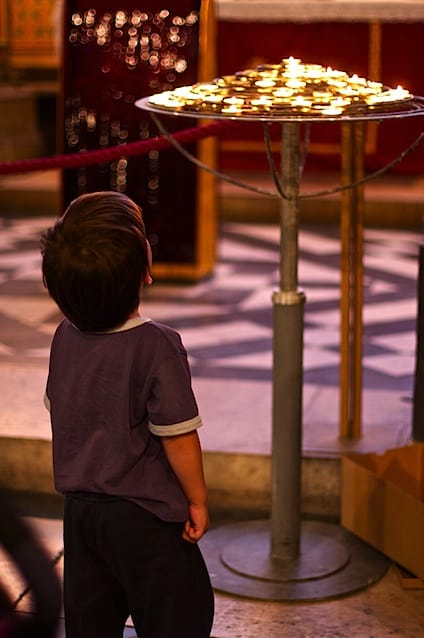For the past couple of days we’ve been talking about a verse that I am digging into with fresh anticipation this year, Hosea 6:6. It says, “For I desire mercy and not sacrifice, and the knowledge of God more than burnt offerings.”

The verse has already taken us to Matthew 9 and Matthew 12, and to Isaiah 58. But the connections just keep coming, and I think we still have some more thinking to do. (I’d suggest reading part one here and part two here.)
In Jeremiah 7, the Lord points out that “I did not speak to your fathers, or command them in the day that I brought them out of the land of Egypt, concerning burnt offerings or sacrifices. But this is what I commanded them, saying, ‘Obey My voice, and I will be your God, and you shall be My people. And walk in all the ways that I have commanded you, that it may be well with you.’ {v. 22 & 23}
The people trusted the sacrifices and burnt offerings taking place at the Temple to keep them from God’s judgement. In the verses leading up to verse 21, God is explaining, through Jeremiah, that the temple would not protect them while they polluted it with wickedness. As Matthew Henry explains it, “…their sacrifices would not atone for them, nor be accepted, while they went on in disobedience.”
Even before the time of Christ, the sacrifices weren’t just sacrifices for the sake of sacrifice. God was saying “Obey My voice {notice He says voice first} and walk the way I’ve told you to walk. And that’s how it’ll be clear that I’m your God and you’re My people.”
There are times in our lives when we want to sacrifice. When the easy route is to go ahead and just let go of something, drop something, or make a hard and fast rule for ourselves. When we do this, we begin to write our own law books, because we would rather just do it our way than follow the heart of God and listen for His voice.
We begin to rely on our own burnt offerings and sacrifices: things like regular attendance at church or Bible studies. We begin to think we don’t need to listen for His leading because, hey, we’ve got this life of faith under control.
This might get me into some controversial territory, but I hope you can hear my heart with this example. For a long time, as a religious conviction, I almost never drank alcohol, and I would be especially careful not to drink alcohol in public. But a series of circumstances brought me face to face with a choice between my law and God’s voice.
A few years ago, I was home from Scotland and heard that an old friend had experienced incredible tragedy. He and his wife lost their child when she was still an infant. Within a year, his wife was in a motorcycle accident and he lost her, too. He’d started a family and had nothing to show for it, but pain, tattoos and memories.
I touched base to express my sorrow for his loss and see if he wanted to catch up while I was in town. I’d shared Christ with him lots and often years before, but I could only see that seeds were sown — I never saw any fruit.
I found myself sitting across the table from him at a restaurant in my hometown, and I somehow just knew I needed to order a beer, make him feel comfortable and at ease, and listen to his story. My mind at first thought “Not, so, Lord! What if someone who knows me sees me drinking a beer here? I might cause offense or cause someone to stumble!” But the Lord’s will was clear in my heart, and soon a Corona and a slice of key lime pie were  sitting on my paper placemat.
After a few minutes of small talk, my friend began to share his story. To say the least, it was heart-wrenching. He’d started riding motorcycles after he and his wife lost their baby girl. He found comfort and solace on the open road. He taught his wife how to drive a motorcycle as well, and she was out driving on her own when the accident happened.
Parts of him were clearly riddled with guilt and anger, but the overwhelming sentiment was just sadness.
And what happened next was such a surprise, it deserves its own post tomorrow, where our story will continue.

 I create resources to help people find deeper, more meaningful relationships with God through pursuing, pondering, and prayer. The "Shop" link above will take you to the home of many of the lovely resources I’ve created to help you keep walking one day deeper with Jesus.
I create resources to help people find deeper, more meaningful relationships with God through pursuing, pondering, and prayer. The "Shop" link above will take you to the home of many of the lovely resources I’ve created to help you keep walking one day deeper with Jesus.
CC
I am just loving your “mercy not sacrifice” blogg! You are such an inspiration to me.
How was Swellendam? Hope you had a great trip, cant wait for you to see my new place soon hopefully.
LC xoxo
I’m so glad, Lea!! Thanks for the encouragement! We really enjoyed Swellendam! I hope I can see your place soon, too! xoxo
Thank you Caroline! God bless you sister for your honesty and openness. Your posts never fail to challenge, exhort, encourage and uplift me. Thank you. I can’t wait to read your next post and hear what happened! So glad to hear how the Lord has been working in your life! Isn’t HE good?! Praise HIM! xx
Thanks so much for the encouragement, Sarah! You are an inspiration to many!! I hope the end of the story is an encouragement, too! 😀